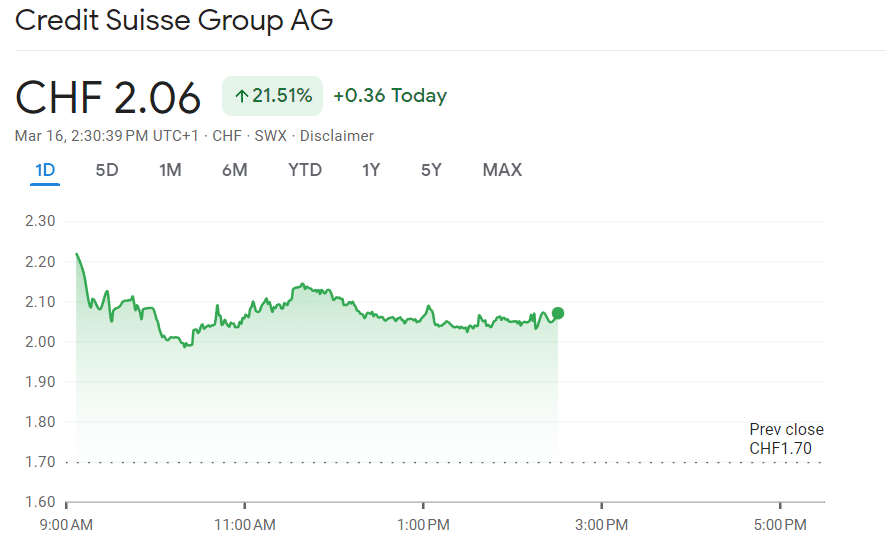Credit Suisse Shares Surge After Swiss Central Bank Backstop and Debt Buyback
-
Updated:

Credit Suisse shares have made a strong recovery, increasing by over 20% on Thursday, after the bank announced plans to borrow up to CHF 50 billion ($54 billion) from the Swiss National Bank (SNB) and buy back around CHF 3 billion worth of its debt. The move aims to improve liquidity and ease investor concerns following a turbulent week for the lender. The SNB had stated on Wednesday that it was prepared to provide a liquidity backstop after Credit Suisse's stock price plunged by as much as 30%.
The decline in share price came as the chair of Saudi National Bank, a key Credit Suisse shareholder, dismissed the possibility of further investment. The drop also coincided with turmoil in global banking stocks following the collapse of Silicon Valley Bank. Credit Suisse stated that its decision to borrow from the SNB was a proactive measure to bolster liquidity through a loan facility and a short-term liquidity facility.
In an effort to buy back debt, the bank plans to tender a cash offer for 10 US dollar-denominated senior debt securities worth up to $2.5 billion and four euro-denominated senior debt securities worth up to €500 million. The offers are set to expire on March 22.
- CEO Ulrich Körner described the steps as "decisive action to strengthen Credit Suisse" as the bank continues its strategic transformation. Körner's restructuring efforts have included the sale of part of Credit Suisse's investment bank and the elimination of thousands of jobs. Yields on the bank's bonds dropped slightly following the announcement, while spreads on its five-year credit default swaps fell from 980 basis points to 898 bps. Meantime, check out swap-free account forex brokers for safe trading.
- UK Chancellor Jeremy Hunt and Bank of England Governor Andrew Bailey are said to be monitoring the situation closely. Analysts have suggested that the improved liquidity position and the support from the SNB and Swiss Financial Market Supervisory Authority will help Credit Suisse regain the trust of investors. However, some uncertainty still remains.
- The latest developments at Credit Suisse have prompted speculation about the bank's future, with JPMorgan analysts suggesting that a takeover, possibly by UBS, is the most likely scenario. This comes as Credit Suisse attempts to rebuild investor confidence following a series of scandals and setbacks that pushed its stock price to an all-time low.
Credit Suisse's announcement and the SNB's liquidity backstop have provided much-needed relief for the beleaguered bank, whose shares had plummeted 39% this year and 85% over the past two years. The bank's market value had fallen below CHF 7 billion, just months after raising CHF 4 billion in capital.
The lender's challenges were further compounded earlier this week when PwC, its auditor, identified "material weaknesses" in Credit Suisse's financial reporting controls. This led to a delay in the publication of the bank's annual report. On Wednesday, Saudi National Bank chair Ammar Alkhudairy stated that the bank had no plans to provide further capital to Credit Suisse, despite having acquired a 10% stake in the Swiss bank last year.
Alkhudairy cited concerns about unwanted regulatory requirements as a result of owning a larger share in Credit Suisse but expressed support for the bank's restructuring plan, adding that he did not believe it required additional capital.
The recent events at Credit Suisse have drawn attention to the vulnerability of European banks, which hold significant bond portfolios whose paper value has been impacted by rising interest rates. While the bank's measures have helped to alleviate immediate concerns, Credit Suisse must continue its strategic transformation and address remaining uncertainties to rebuild investor confidence and secure its long-term future.




